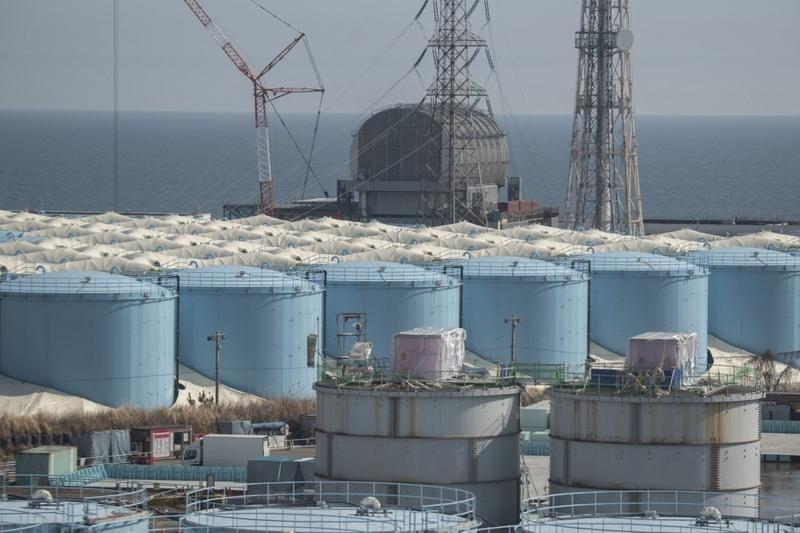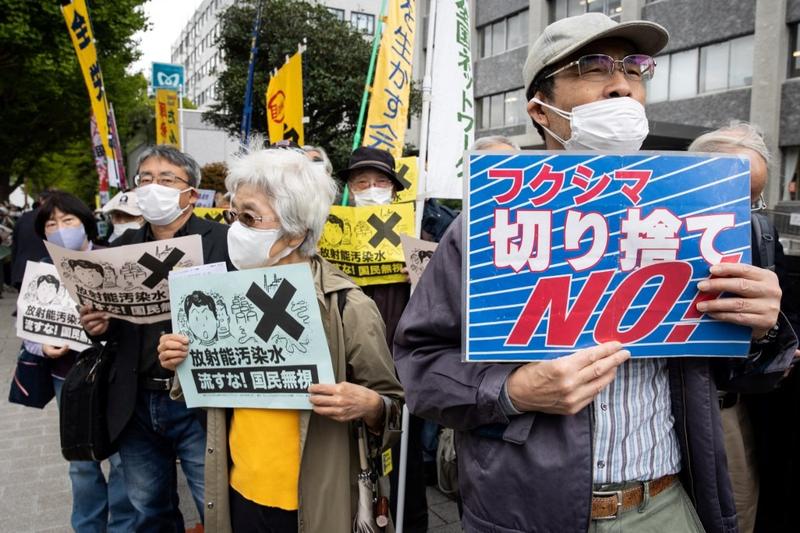 This picture taken on March 5, 2022 shows the unit 3 reactor building and storage tanks (foreground) for contaminated water at the Tokyo Electric Power Company (TEPCO) Fukushima Dai-ichi nuclear power plant in Okuma, Fukushima prefecture.
Japan on March 11, 2022 marks the 11th anniversary of an earthquake and tsunami that left 18,500 people dead or missing and triggered a devastating nuclear meltdown in Fukushima.
(CHARLY TRIBALLEAU / AFP)
This picture taken on March 5, 2022 shows the unit 3 reactor building and storage tanks (foreground) for contaminated water at the Tokyo Electric Power Company (TEPCO) Fukushima Dai-ichi nuclear power plant in Okuma, Fukushima prefecture.
Japan on March 11, 2022 marks the 11th anniversary of an earthquake and tsunami that left 18,500 people dead or missing and triggered a devastating nuclear meltdown in Fukushima.
(CHARLY TRIBALLEAU / AFP)
The international community continues to oppose the Japan’s decision to dump contaminated water from the crippled Fukushima nuclear plant into the ocean, noting such move will endanger the health, environment and livelihood of surrounding nations.
The Japanese government said on April 23, 2021 that they would discharge over one million tons of contaminated water into the Pacific Ocean, stating the water would first be treated using an advanced liquid processing system to remove most contaminants. The Tokyo Electric Power Company (TEPCO) will be gradually discharging the contaminated water starting in the spring of 2023.
China, South Korea and Pacific Island countries are among those which have immediately opposed this move. A year after the announcement was made, governments, environmental groups and experts around the world remain vocal, pressuring Japan to use a safer alternative to discharging the contaminated water.
South Korea’s Representative Seo Sam-seok of the liberal Democratic Party said in an April 11 forum that the discharge “will spread across the entire Pacific Ocean in 10 years and affect almost all of our sea,” according to a report filed by Xinhua.
South Korea’s Representative Seo Sam-seok of the liberal Democratic Party said the discharge “will spread across the entire Pacific Ocean in 10 years and affect almost all of our sea”
The Pacific Islands Forum (PIF), which is comprised of 18 countries, has appointed in March an independent panel of global experts on nuclear issues. The panel will provide independent technical advice to PIF in its ongoing dialogue with Japan on the Fukushima wastewater.
PIF Secretary General Henry Puna said in a statement that the forum’s “ultimate goal is to safeguard the Blue Pacific – our ocean, our environment, and our peoples – from any further nuclear contamination. This is the legacy we must leave for our children”.
Tilman Ruff, Nobel Peace Prize Laureate and co-president of International Physicians for the Prevention of Nuclear War (IPPNW), said the concern voiced by Japan’s neighboring countries are “justified”, noting the “significant amount of radioactivity” involved in the Fukushima wastewater.
READ MORE: Nuclear water plan slammed
“All radioactivity has harmful health consequences for all living things, not just humans. Once (the contaminated water was) released into the ocean, they will be minutely distributed with the ocean current and they will find their way into the food chain,” Ruff said in an interview with China Daily.
 Demonstrators hold slogans during a protest against the Japanese government’s plan to release more than a million tonnes of treated water from the stricken Fukushima nuclear plant into the ocean, outside the prime minister’s office in Tokyo on April 13, 2021.
(YUKI IWAMURA / AFP)
Demonstrators hold slogans during a protest against the Japanese government’s plan to release more than a million tonnes of treated water from the stricken Fukushima nuclear plant into the ocean, outside the prime minister’s office in Tokyo on April 13, 2021.
(YUKI IWAMURA / AFP)
He said every increase in radiation “poses some level of risk. There's no level below which you can say there’s no effect”. Children and women are more vulnerable to the ill effects of radiation.
“Children are three to five times more sensitive to the long term cancer-inducing effects of a given dose of radiation than adults. Women and girls are about 40 percent more susceptible to cancer induction than males from a given dose of radiation,” Ruff stressed.
All radioactivity has harmful health consequences for all living things, not just humans. Once (the contaminated water was) released into the ocean, they will be minutely distributed with the ocean current and they will find their way into the food chain.
Tilman Ruff, Nobel Peace Prize Laureate
Ruff said there are “reasonable alternatives” to dumping wastewater into the ocean. One option is to contain them in a land-based storage.
Greenpeace group said that the “most acceptable solution” is to continue long-term storage and processing of the contaminated water at its original site, rather than releasing it to the ocean. The international environmental group has submitted technical analysis to UN agencies, held seminars with local residents of Fukushima, and urged the Japanese government to reverse its plan to discharge the contaminated water.
The Northern Mariana Islands, a US-controlled territory some 2,500 kilometers southeast of Japan, supports Greenpeace’s proposal. The territory has adopted a joint resolution opposing any nation's decision to dispose of nuclear waste in the Pacific Ocean.
“The effort that went into the creation of the joint resolution exposed research and reports from Greenpeace East Asia highlighting alternatives for the storage of Japan's nuclear waste, including the only acceptable option, long-term storage and processing using the best technology available,” “said Sheila Babauta, a member of the Northern Mariana Islands’ House of Representatives.
Renato Redentor Constantino, executive director of the Institute for Climate and Sustainable Cities think tank in Manila, said Japan’s decision to dump wastewater despite its potentially harmful impact on its neighbors has shown that Japan “has learned nothing” from its history.
“The stain of shame is twice layered on Japan. First for the obscenity of dumping on innocent lives the folly of its refusal to leave behind its deadly embrace of nuclear energy. Second, because it has learned nothing despite having been a victim of nuclear dumping through the Hiroshima and Nagasaki bombs,” Constantino told China Daily.
TEPCO is planning to dump wastewater that was stored at the site of Fukushima Daiichi Nuclear Plant into the Pacific Ocean. This wastewater has been used to cool highly radioactive damaged reactor cores after the massive earthquake and tsunami in 2011 destroyed the Fukushima plant’s cooling systems. The Japanese government said it has to dump the wastewater as it has run out of room to store it.
But an investigation made by Greenpeace that the contaminated water of Fukushima is “distinguished” from other nuclear power plants because of its “higher radioactivity”.
“The contaminated water generated by the Fukushima disaster has come into direct contact with contamination from the melted down cores of three reactors and as such is severely contaminated with many radionuclides,” Greenpeace said.
For example, an “enormous amount” of strontium-90, one of the most hazardous radionuclides, remains in the Fukushima plant. Human bodies can readily absorb strontium-90 and can potentially cause leukemia.
Ruff of IPPNW said there’s a “general growing norm that radioactive wastes should not be dumped indiscriminately into the ocean and into places where they’re not contained and properly can’t be properly monitored and managed”.
ALSO READ: Japan maps out action plan for disposal of Fukushima water
He said Japan’s claim that it has run out of space to store the wastewater “is just a red herring”. He cited that Japan is already using the towns of Okuma and Futaba as storage facility.
“There is actually quite a lot of land around the site that could be a site for expanded storage facilities,” he said.
The planned discharge is unpopular even among various sectors in Japan. Consumer groups, fisheries associations and other civil society groups in the most affected prefectures submitted a petition in late March to the Ministry of Economy, Trade and Industry and TEPCO, reaffirming their opposition to the release of the contaminated water and demanded the government to pursue other options.


